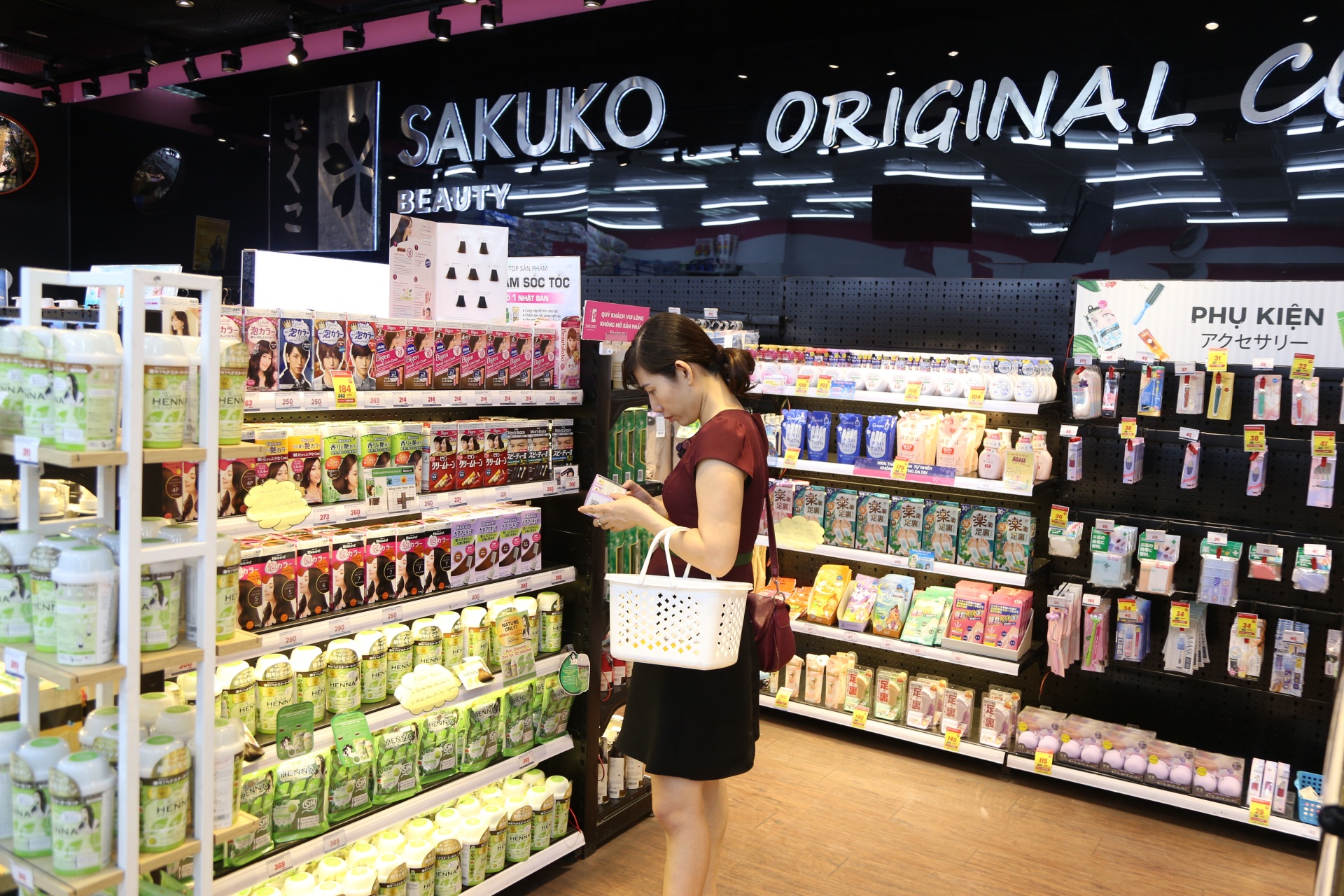Japanese retailers are committed to the huge potential of the Vietnamese market
 |
| Japanese retailers are committed to the potential of the Vietnamese market |
Sakuko Japanese Store, a Japanese supermarket chain, is still committed to the Vietnamese market after 10 years of operation. The retailer operates 33 stores in Hanoi and many other localities, selling mother and baby, cosmetics, food, healthcare, fashion, stationery, as well as home and life products.
Most recently, Sakuko Vietnam Retail Co., Ltd., the operator of the Japanese supermarket chain, has announced its plan to increase the number of its outlets to 60 stores in Vietnam by 2025. Under its plan, Sakuko Vietnam will expand its chain in the densely populated areas of Hanoi and other northern localities, targeting middle-class consumers. The retailer also plans to venture into the southern region in the next five years.
Cao Thi Dung, CEO of Sakuko Vietnam Retail Co., Ltd. said that Vietnam is an extremely promising market for Japanese retailers. In particular, Japanese goods are trusted by Vietnamese customers due to their high quality. Growing bilateral trade between the two countries also facilitate Japanese manufacturers and importers to access the local market. Thus, Japanese retailers can gain more advantage to diversify their sources of goods to meet all needs of Vietnamese consumers.
Sakuko Vietnam continues to expand its footprint in the midst of the global health crisis to satisfy the needs of customers who are looking for Japanese products with clear origin, prestige, and quality. At the same time, the Japanese retailers aims to accompany customers with tight-spending budgets during the crisis.
Dung shared that the company also faces some challenges in expanding operations amid the pandemic. In particular, the company incurred higher operation expenses, logistics costs, and human resources challenges due to social distancing. However, with 10 years of experience in retail, Sakuko has made efforts to overcome the challenges to ensure business and ensure logistics continuity.
“We accept higher expenses to keep good track of product supply so that our stores can provide continuous services to customers. We also try to diversify categories and restructure product portfolios to meet the evolving demand of customers during the pandemic. This, coupled with increasing omnichannel presence and customer care services, brings convenience to customers even in the context of the pandemic,” Dung added.
Like Sakuko, many other Japanese retailers are also looking for opportunities in Vietnam in the long run. They continue investing to expand the market share when the country is easing social distancing regulations.
UNIQLO, the Japanese global apparel retailer, will open the ninth store in Vietnam by the end of October. Located at AEON Mall Hadong, UNIQLO’s latest store covers an area of 1,000 square metres. Meanwhile, TOKYU is planning to open a new shopping center in New City in Binh Duong in 2023 and AEON will be one of the core tenants. In July, Japanese chain retailer Muji opened its first store in Hanoi after opening one in Ho Chi Minh City last November.
Hirai Shinji, chief representative of the Japan Trade Promotion Organization (JETRO) in Ho Chi Minh City, said, “Among ASEAN countries, Japanese retailers previously chose Singapore, Malaysia, Thailand, or Indonesia for their business expansion. Vietnam, the third-largest among ASEAN countries in terms of population, was regarded as a potentially attractive market, but it is only recently that most Japanese retailers decided to open their shops in Vietnam as the GDP per capita of Vietnam is close to $3,000.”
The economic ties between Japan and Vietnam is expected to be upgraded accordingly as the economy of Vietnam develops. Previously Vietnam might be looked upon as a site for production. In particular Japanese companies, entitled as an export processing enterprise, import parts, and materials from Japan, and export final product back to Japan. In this case, knowledge on local Vietnamese market does not matter so much.
“But recently, as the economy of Vietnam develops, the size of the local consumption market is attractive. The GDP of Vietnam is comparable with the size of a major prefecture of Japan. But if the GDP increases at an annual rate of 7 per cent, then 10 years later, the size will be twice. It is very promising, so not only manufacturing but also non-manufacturing companies in the retail and service sectors come to Vietnam year by year,” he added.
What the stars mean:
★ Poor ★ ★ Promising ★★★ Good ★★★★ Very good ★★★★★ Exceptional
Related Contents
Latest News
More News
- EU and Vietnam elevate relations to a comprehensive strategic partnership (January 29, 2026 | 15:22)
- Vietnam to lead trade growth in ASEAN (January 29, 2026 | 15:08)
- Japanese business outlook in Vietnam turns more optimistic (January 28, 2026 | 09:54)
- Foreign leaders extend congratulations to Party General Secretary To Lam (January 25, 2026 | 10:01)
- 14th National Party Congress wraps up with success (January 25, 2026 | 09:49)
- Congratulations from VFF Central Committee's int’l partners to 14th National Party Congress (January 25, 2026 | 09:46)
- 14th Party Central Committee unanimously elects To Lam as General Secretary (January 23, 2026 | 16:22)
- Worldwide congratulations underscore confidence in Vietnam’s 14th Party Congress (January 23, 2026 | 09:02)
- Political parties, organisations, int’l friends send congratulations to 14th National Party Congress (January 22, 2026 | 09:33)
- Press release on second working day of 14th National Party Congress (January 22, 2026 | 09:19)

 Tag:
Tag:




















 Mobile Version
Mobile Version